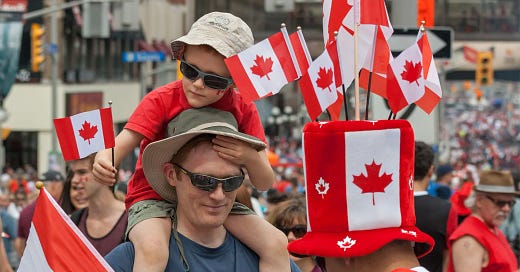The Historical Significance of Canada Day
Canada Day, celebrated annually on July 1st, marks the anniversary of the Canadian Confederation in 1867. This pivotal day in history witnessed the unification of three separate colonies—United Canadas, Nova Scotia, and New Brunswick—into a single Dominion within the British Empire, known as Canada. The British North America Act, which facilitated this unification, served as Canada’s Constitution until it was patriated in 1982, symbolising the country’s burgeoning independence, nay sovereignty, and national identity.
Originally known as Dominion Day, the holiday was renamed Canada Day in 1982, coinciding with the patriation of the Canadian constitution through the Canada Act 1982. This significant legislative change allowed Canada full sovereignty over its Constitution, eliminating the need for British Parliamentary consent for amendments. The Constitution Act, 1982, proclaimed by Queen Elizabeth II, underscored this newfound autonomy.
Festivities and Traditions
Canada Day is a federal statutory holiday celebrated with a multitude of festivities, including fireworks, parades, concerts, carnivals, and barbecues. In the nation's capital, Ottawa, grand concerts and cultural displays are held on Parliament Hill, often officiated by the governor general and prime minister. Occasionally, the monarch or another member of the royal family may attend, adding a touch of regal splendour to the celebrations.
Across Canada and internationally, Canadian expatriates and communities partake in celebrations, highlighting the day’s importance and fostering a sense of unity and national pride. The day is a testament to Canada’s diverse and vibrant culture, celebrated from coast to coast.
Canada’s Role in the Commonwealth
As a member of the Commonwealth of Nations, Canada shares the British monarch as Head of State. Currently, King Charles III serves as the King of Canada, a role distinct from his position as monarch of the United Kingdom. This connection underscores Canada's historical ties to Britain while simultaneously showcasing its independent national identity.
Canada-U.S. Relations: A Bond Beyond Borders— Under Stress
Canada Day 2025 unfolds at a time of immense strain—but also cautious optimism—in Canada-U.S. relations. The two allies have been navigating the most turbulent phase in decades, triggered by President Trump’s sweeping tariffs on Canadian goods and escalated further by a digital services tax crisis. Prime Minister Mark Carney’s decision to rescind the tax just hours before implementation, and a subsequent agreement at the G7 Summit to resume trade talks by 21 July, marked a critical diplomatic breakthrough in an otherwise confrontational year.
Despite lingering tensions—25% tariffs remain in place and Trump’s rhetoric continues to challenge Canadian sovereignty—both countries have made strides in border security cooperation and economic dialogue. As Canadians celebrate their National Day, the evolving relationship with the United States serves as a sobering reminder of the pressures global politics can place on even the closest of allies, and the resilience required to preserve shared values, interests, and prosperity.
Canada-India Relations: A Renewed Partnership
Canada-India Relations: A Shared Future
Today’s celebration of Canada Day holds special significance for the Punjabi and Sikh diaspora residing in Canada. This community has played a vital role in enriching Canada’s multicultural fabric, bringing with it vibrant cultural traditions and a deep sense of community. The ties between Canada and India—particularly with Punjab—have recently undergone a remarkable transformation following diplomatic tensions that had reached their lowest point in decades.
Under the new leadership of Prime Minister Mark Carney, who assumed office in March 2025 following the resignation of Justin Trudeau in January, Canada-India relations have undergone a significant diplomatic reset. As we extend our best wishes to Canadian citizens and permanent residents on this joyous occasion, we witness a revitalisation of Canada-India relations that appeared unthinkable only months ago. The shared history, values, and aspirations between our two nations continue to provide a strong foundation for collaboration and mutual development, now reinforced by renewed diplomatic engagement and restored trust.
Looking Ahead: A New Political Landscape
Canada has experienced a profound political shift since the last Canada Day celebration. Justin Trudeau stepped down as Prime Minister in January 2025 amid growing internal pressure and the dramatic resignation of Deputy Prime Minister Chrystia Freeland. Mark Carney—former Governor of both the Bank of England and the Bank of Canada—assumed leadership and went on to win the federal election held on 28 April 2025. The Liberals secured 169 seats, falling just three short of a majority, thereby necessitating the formation of a minority government.
The election outcome marked a striking reversal of polling forecasts that had consistently favoured Pierre Poilievre’s Conservative Party throughout 2024. Carney’s triumph represented one of the most remarkable political comebacks in Canadian electoral history. Key issues during the campaign included the economy, healthcare, climate change, cost of living, and the need to respond to trade pressures emanating from U.S. President Donald Trump.
A Diplomatic Breakthrough
The most notable development in Canada-India relations occurred at the G7 Summit hosted in Kananaskis, Alberta, in June 2025. Prime Minister Carney’s invitation to Prime Minister Narendra Modi marked a critical turning point. Both leaders agreed to reinstate High Commissioners in each other’s capitals and resume normal diplomatic operations.
The bilateral relationship had deteriorated sharply under Trudeau’s tenure, especially after allegations of Indian involvement in the killing of Sikh separatist Hardeep Singh Nijjar in 2023. The incident prompted reciprocal expulsions of diplomats and led to an almost complete cessation of bilateral engagement. However, the Modi-Carney meeting in June 2025 resulted in an agreement on “calibrated steps” to restore stability. Both leaders underscored their commitment to shared democratic values, adherence to the rule of law, and mutual respect for sovereignty.
Renewed Cooperation and Future Prospects
This diplomatic reset has paved the way for collaboration across numerous sectors, including clean energy, digital transformation, artificial intelligence, LNG, food security, critical minerals, higher education, and supply chain resilience. Both countries have pledged to resume senior ministerial and working-level engagements to rebuild trust and regain momentum in the relationship.
This shift signals a new chapter in Canada-India relations—one of transition from crisis to cooperation under new leadership. It is a reminder that diplomatic ties, however strained, can be renewed through dialogue, mutual respect, and the identification of common interests.
In conclusion, today’s Canada Day represents not only a celebration of the past but also a beacon of hope for a more prosperous future. It is a day to reflect on Canada’s political transformation, celebrate the multiculturalism embodied by the thriving Sikh diaspora, and look forward to a renewed and productive partnership with India. Our heartfelt wishes go out to all Canadians today as we celebrate a future in which Canada-India relations have not only weathered their most serious challenge but have emerged stronger—enriching both nations through restored diplomatic ties and a shared commitment to progress.
If you believe this article would interest someone you know, please feel free to share it anonymously (for us), using any platform that you prefer.








Happy National Doctor's Day! 🇮🇳
https://open.substack.com/pub/hunterm/p/71?r=2a2l5m&utm_campaign=post&utm_medium=web&showWelcomeOnShare=false